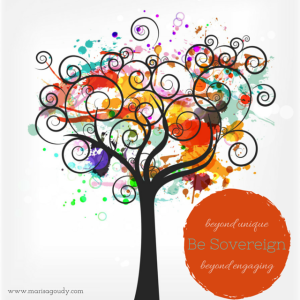The Words You Use - And Won't Use - To Describe & Market Yourself
The Sovereign Standard, Issue 4
Today, the one sure way to fail is to be boring. Your one chance for success is to be remarkable.
Seth Godin wrote that in Fast Company in 2003 when he was promoting his then new book, Purple Cow. Essentially, he was telling marketers and entrepreneurs that they had to be one thing: remarkable.
In the last 10+ years, this has only become more true and more important. And because you’re a creative entrepreneur who tunes into the Godin Oracle (or someone emulating him) you take great care to prove that you’re a horse - or a cow - of a different color.
And So It Begins: The Quest for the Unique Job Title
Thank goodness we’re past the days when women were limited to “nurse” or “teacher.” Now, both women and men have the opposite problem. A whole new world of work has emerged in less that a generation - but so have the tongue twisting titles.
This article pokes fun at the self professed “Digital Overlord” and the “Change Magician“ - actual job titles people have posted on LinkedIn. It’s easy to giggle at the “Wizard of Light Bulb Moments,” but then you might start to worry that your creative title could seem just as silly to the uninitiated.
To return to Seth and his barnyard:
We face two choices: Either be invisible, uncriticized, anonymous, and safe or take a chance at true greatness, uniqueness, and the Purple Cow.
At least the “Retail Jedi” mentioned in that “gotcha” post got noticed. And even if that guy was lampooned, there just might be a Leia out there who’s having trouble moving her back inventory of Ewok treats who really needs a lightsaber-wielding, product moving savior.
If you're remarkable, then it's likely that some people won't like you. That's part of the definition of remarkable. Nobody gets unanimous praise — ever. (S.G.)
Choosing the Right Words for the Right Reasons
The choice to devise a unique title for yourself or your work isn’t just about marketing. It is also about owning your story and the space your business occupies in the hearts of your perfect people.
 My word? Sovereignty.
My word? Sovereignty.
I’m taking a term that generally refers to heads of state and absolute authority, and giving it a new meaning for the contemporary creative entrepreneur.
If you’ve been wondering what’s behind my sovereignty story, I invite you to spend some time with this post - I’m terrifically happy with where all this is heading and I want you with me from the beginning!
And since we’re redefining sovereignty for the 21st century - crowning ourselves and ruling our own lives without impinging on the freedoms of others - we also have the opportunity to name ourselves. (Wouldn’t Louis XVI be jealous?)
So let’s do it, right? Open up the dream journal and pull a thesaurus off the shelf. It’s time to christen yourself a "Manifestation Magnifier"!
(Hm, or is it?)
Say you're a coach. How many coaches have received credentials in the last decade? If there are any industries that demand a creative personal title, life and business coaching are at the top of the list.
In a crowded marketplace, fitting in is failing. In a busy marketplace, not standing out is the same as being invisible. (S.G.)
Who wants to be an invisible coach? You end up lonely, broke, and suffering serious creative congestion.
If there’s power in naming - religion and literature surely prove this - then it’s time to use all of your creative powers to give yourself a title that differentiates you from all the rest.
Or not.
Abby Kerr takes the “just don’t call me a coach!” lament head on. She asks:
But when did the desire to differentiate jump the shark? When is jazzing up your job title taking it too far?
Answer: when your colorful language clutters comprehension.
Agreed.
There’s a balance to strike between staking an original claim and picking something so unorthodox that people say “huh?” before they wander away to find someone who speaks their language.
The Balance: It’s Your Story, But the Buyer is the Hero
Chris Brogan’s “make the buyer the hero” concept can be applied in many different ways, like in this piece about making content marketing work. Ultimately, the work you do and the story you tell about that work (your marketing) isn’t about all the neat stuff you do. Instead, it’s about all the wonderful things a client will experience when she invests in your vision and your solutions.
 So, apply that perspective to the title you give yourself, your business, or your signature approach…
So, apply that perspective to the title you give yourself, your business, or your signature approach…
In order for a stranger to become the hero in the story of your business, she needs to feel comfortable enough with the theme, the plot, and the main characters. That means the first words she sees must immediately show her who you are and what your role is - in words she can understand.
What do people understand? The words that “everybody” uses. To return to Abby’s example: "coaching," not some polysyllabic invention.
A greater proportion of the public understands “pet psychic” rather than “animal intuitive.” It’s likely that “shamanic training” means more to them than “mystery school.” They’re looking for “marketing” not “buying community sustainable growth practices.”
Whose Story Is This Anyway?
Making the buyer the hero doesn’t mean you must be restricted to “the customer is always right” thinking or a contort yourself to fit the needs of the marketplace. It is, however, a good counterpoint if entrepreneurship - a deeply personal process these days - starts to become too personal.
Based on a realization that “ today’s marketing and business coaches are the therapists of the new century” Blair Glaser unpacks why entrepreneurism can be seen as the new therapy.
Blair's exploration rings very true… and I think the piece can serve to remind the "heart centered" business owner not to get so caught up in branding and self realization that the work and clear, well-considered communication gets lost in the process.
Yes, your creative entrepreneur's autobiography matters, but running a business isn't just about self expression.
So, how do you settle the "what's in a name?" question for yourself?
Personally, I don't have "coach" phobia. I didn't complete a program with dozens of other writing coaches all trying to pick the perfect colored cow - I gave myself that title based on my experience and expertise.
As I mentioned above, my word, my Purple Cow is Sovereignty. I apply the word liberally - to my newsletter, my #365project, and my developing products - but you won't see me calling myself a Sovereignty Scribe.
Ultimately, you set your own sovereign standard and you’ll have to decide whether clever trumps comfortable or vice versa.

